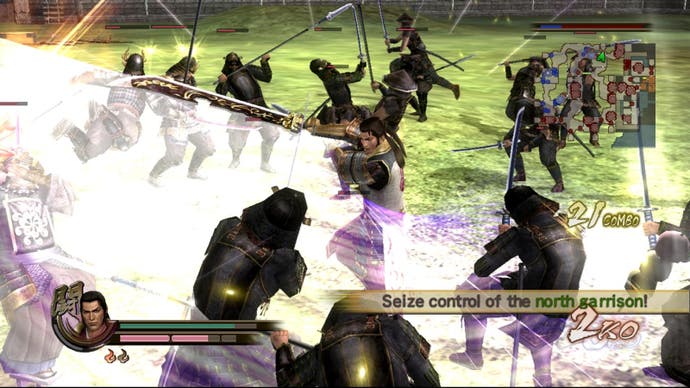Samurai Warriors 2
Love is a battlefield.
The generic marketing survey that falls out of the Samurai Warriors 2 manual asks 'what motivated you to purchase this game?' It goes on to offer a selection of choices, but the one that stands out is: 'Liked the original'. Yep, the marketing survey simply assumes that you've bought a sequel. Which is sort of appropriate. You only have to type 'warriors' up in the top left corner to see a) how many of these battlefield epics Koei has already brought out, and b) how each successive instalment seems to sap a little bit of each reviewer's generosity.
The problem Koei has with (western) reviewers is that, to the untrained eye, each new instalment seems to add so little to what's gone before. Sure, Samurai Warriors 2 has (according to the blurb) 26 playable characters, a bunch of different play modes, an insane amount of enemy combatants, castles, combos, crazy voice-acting, amazing cut-scenes, special moves, sidekicks, spangly graphics, and a palm-moistening imperative to multitask amid the chaos of battle. But then so have pretty much all the other games in the series. And so reviews tend to follow an equally consistent formula: talk about how many features the game packs in, before pointing out that it's basically the same as the last game, and after a while all the battlefield-button-bashing gets a bit boring.
That's missing the point. It's a bit like saying that just driving round racetrack after racetrack gets a bit dull, and couldn't they have added something more this time. Or like saying that isn't it a bit old-hat just using the controller to look around and move and shoot, and couldn't they have done something else this time. And so on. Because Samurai Warriors 2, like the other games in the series, isn't really about the sophistication of the third-person combat engine. It's about the ebb and flow of the battlefield, reacting to new events and adjusting to sudden shifts in fortune while simultaneously surrounded by hordes of relentlessly advancing enemy footmen.
It's about working out where on the field of battle you need to be, and how you're going to get there, and whether to risk a detour to rescue one of your allies or to capture a stronghold. It's about immersing yourself in the chaos for up to an hour at a time, trying to make sense of it and take control of it, only to emerge at the end, sweaty-palmed, with a thousand-yard stare brought on by the sheer intensity of it all.

That's why Samurai Warriors 2 is rarely boring, even though all 26 characters have five levels to play through, and it's why sequels to these games aren't about new features, they're about new battlefields, new scenarios, and the unique narrative that players create across each one. That's why Koei gets it right every time they bring one of these games out.
Nevertheless, if you're looking for new features, you will find them: character-specific special abilities, a revised character levelling system, new skills, seamless transitions between indoor and outdoor environments, and head-to-head competition over Xbox Live (which sees players racing to eliminate AI opponents, rather than taking each other on in real time). There's even a variant of Japanese boardgame Sugoroku thrown in for good measure, which plays a bit like Monopoly. Although it can be played by up to four players, it's not exactly a party-game, and it's not entirely easy to pick up at first owing to a slightly clunky interface. But it is reasonably entertaining to play against the AI, and it's enlivened by challenges that see you take control of your character battlefield again.
And, as with all the other games in the series, there's so much included, so much replay value, so much polish - even the histrionically over-the-top voice-acting has become an entertaining and enduring hallmark of the series. And the cut-scenes! Okay, so we all know that nobody plays games for the cut-scenes, but the vignettes that bookend the action are absolutely on a par with some of the finest action sequences from Asian cinema.
That's why these games sell so many copies and win so many plaudits in their native territories - because they're absolutely great, and if it ain't broke then don't fix it, and if they continue to be this thrilling, this visceral, this bombastically brilliant, then more of the same is absolutely spot on. Sign me up.
